The Deadlock in India The differences between Congress and the
Governors in India have narrowed to a point which would make the situation ridiculous if it were not so serious. Mr. Gandhi has said, in an interview with the Manchester Guardian, that all Congress is asking for is " an assurance of non-intervention in day-to-day administration." The Under-Secretary• for India said in the House of Commons on Monday that it was certainly not the intention of Parliament or the Govern- ment that the Governors should trench on the wide powers which it was the purpose of Parliament to place in the hands of the Ministries " and which it is our desire that they should use in furtherance of the programme which they have advocated." It is plain that the difference between those two attitudes is as narrow as a razor's edge, and if reason and common sense prevailed the difficulties could be cleared up in five minutes. Unfortunately prestige is held to be engaged, and there are differences between moderates and extremists to be composed. That the Congress Working Committee, now in session at Delhi, will take action leading to a settlement is not expected. The obvious solution is a talk between the Viceroy and Mr. Gandhi, but while it has been intimated that the Viceroy will receive Mr. Gandhi if he asks to be received, it is apparently considered unsuitable that the Viceroy should ask Mr. Gandhi to tea and have a common-sense talk with him. It is to be hoped that Lord Linlithgow will yet show himself large-minded enough to take an initiative that would in all likelihood end the deadlock.
* * * *


































































 Previous page
Previous page